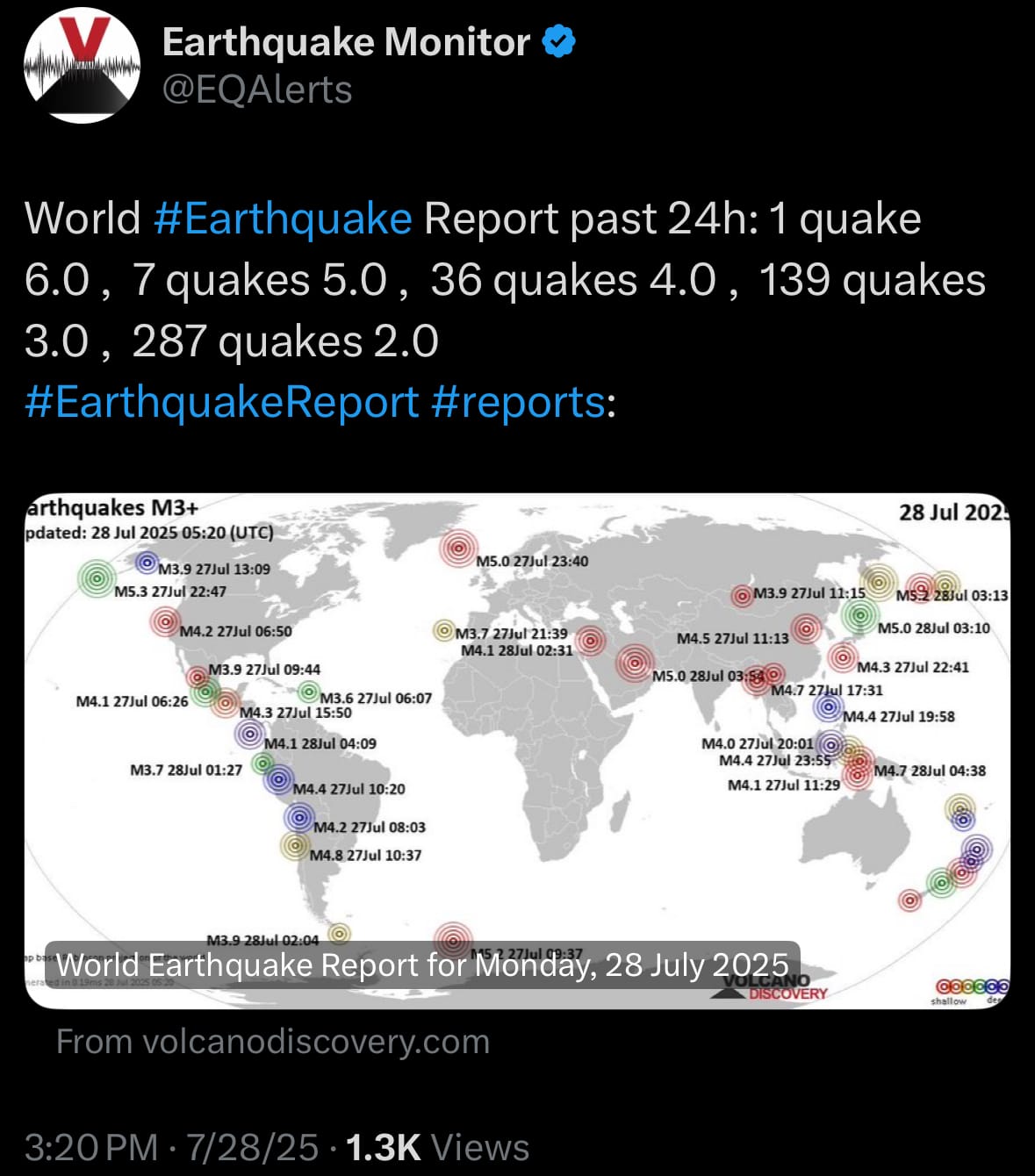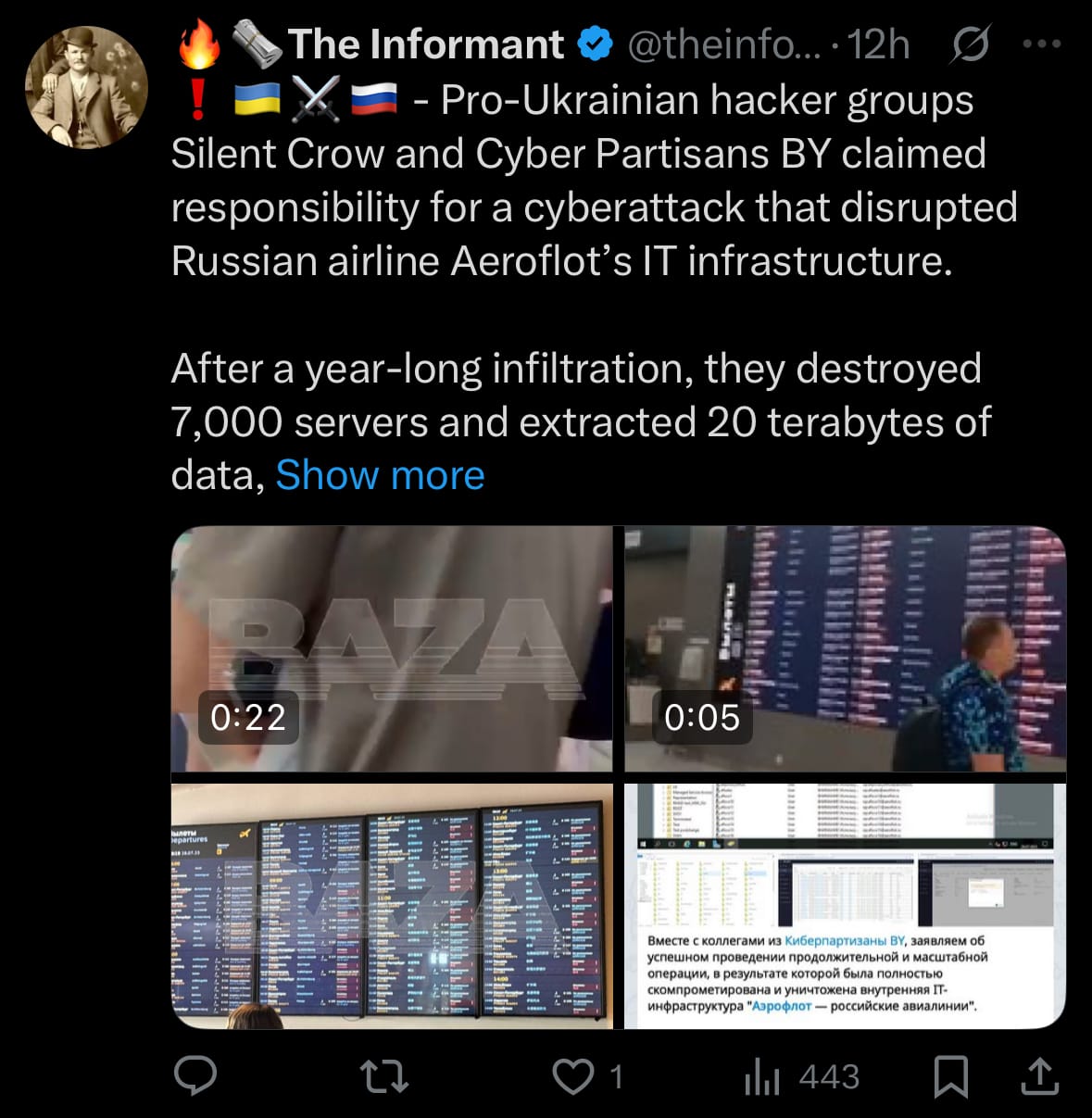Tuesday☕️

Trending:
- Yesterday, July 28, 2025, a shooting occurred in New York City where a high-rise building housed offices for Blackstone, the NFL headquarters, Deutsche Bank, JP Morgan, and the Consulate General of Ireland. The suspect, identified as 27-year-old Shane Tamura from Las Vegas, Nevada, was armed with an AR-15-style assault rifle and opened fire. This resulted in at least three confirmed fatalities, including an off-duty NYPD officer and two civilians, along with at least six injuries, some critical. The gunman entered the building, leading to a lockdown and evacuations, before being found deceased on the 33rd floor from an apparent self-inflicted gunshot wound. No accomplices were identified, and the scene was declared secure by authorities.

- The NYPD, FBI, and emergency services responded with a Level 3 mobilization, deploying SWAT teams, K9 units, and aerial support to clear the building floor by floor. Approximately 100 people sheltered in place during the event, with victims transported to nearby hospitals. The motive remains under investigation, with no confirmed ties to terrorism or extremism, though unverified reports mentioned possible shouts related to geopolitical issues. Governor Kathy Hochul urged the public to avoid the area, and the incident has sparked discussions on gun control, given New York City's strict regulations on assault weapons. Updates continue as federal and local probes examine Tamura's background, travel, and potential violations of firearm laws.
Economics & Markets:
- Yesterday’s U.S. stock market:

- Yesterday’s commodity market:

- Yesterday’s crypto market:

Environment & Weather:
- Yesterday, July 28, 2025, heavy rainfall led to significant flooding in Miyun District, located in northeastern Beijing, China. This was caused by the overflow of the Qingshui River and elevated water levels at the Miyun Reservoir, which reached their highest point since 1959. Casualty reports differ across sources: early statements referenced 2 deaths in Miyun, while later accounts from certain outlets reported up to 28 deaths in the district; additionally, 4 to 6 fatalities were noted from landslides in adjacent Hebei province, with 8 individuals still missing there.

- Evacuations affected 3,000 to 17,000 people in Miyun from various villages, and more than 80,000 individuals were relocated across Beijing and surrounding regions. In response, officials implemented a Level-I emergency protocol, which included road closures, red alerts for ongoing heavy rain, and the mobilization of rescue personnel, with further rainfall expected. This incident illustrates persistent challenges posed by extreme weather in northern China, associated with the East Asian monsoon season and influenced by climate change, building on patterns observed in prior flood events.

Cyber:
- Yesterday, July 28, 2025, Russia's national airline Aeroflot faced a significant disruption to its IT systems, resulting in over 50 flight cancellations primarily from Moscow's Sheremetyevo Airport and operational issues at St. Petersburg's Pulkovo Airport. Pro-Ukrainian hacker groups Silent Crow and Cyber Partisans BY claimed responsibility for the cyberattack, stating they had infiltrated the network for over a year before destroying around 7,000 servers and extracting approximately 20 terabytes of data, including flight records and internal communications. The hackers threatened to release the data publicly, framing the action as a response to perceived failures in Russian infrastructure security amid ongoing geopolitical tensions. Passengers experienced delays and strandings, with Aeroflot acknowledging a "system outage" and offering limited options for refunds or ticket changes until restoration efforts could be completed.

- Russian authorities responded promptly, with the Prosecutor General's Office initiating a criminal investigation into the incident, and Kremlin spokesperson Dmitry Peskov describing it as a serious threat to critical infrastructure. Aeroflot reported that recovery was underway but could take time, highlighting vulnerabilities in Russia’s aviation sector, already impacted by international sanctions. No official statements came from Ukrainian authorities, and independent verification of the hackers' claims regarding the scale of the breach remains pending. The event underscores the role of cyber operations in broader conflicts, affecting civilian services without immediate financial demands from the perpetrators.
Statistic:
- Largest public oil & gas companies by market capitalization:
- 🇸🇦 Saudi Aramco: $1.620T
- 🇺🇸 Exxon Mobil: $480.26B
- 🇺🇸 Chevron: $317.75B
- 🇨🇳 PetroChina: $213.44B
- 🇬🇧 Shell: $212.20B
- 🇫🇷 TotalEnergies: $133.90B
- 🇺🇸 ConocoPhillips: $122.47B
- 🇨🇳 CNOOC: $117.41B
- 🇺🇸 Southern Company: $103.74B
- 🇦🇪 TAQA: $102.54B
- 🇨🇦 Enbridge: $99.40B
- 🇨🇳 Sinopec: $93.67B
- 🇺🇸 Duke Energy: $91.40B
- 🇬🇧 BP: $84.91B
- 🇧🇷 Petrobras: $78.23B
- 🇺🇸 Williams Companies: $70.22B
- 🇦🇪 ADNOC Gas: $69.58B
- 🇺🇸 Enterprise Products: $67.56B
- 🇨🇦 Canadian Natural Resources: $66.85B
- 🇺🇸 EOG Resources: $66.39B
- 🇳🇴 Equinor: $66.23B
- 🇺🇸 Energy Transfer Partners: $61.01B
- 🇺🇸 Kinder Morgan: $60.46B
- 🇷🇺 Rosneft: $54.69B
- 🇺🇸 Marathon Petroleum: $53.70B
History:
- ExxonMobil traces its origins to the founding of Standard Oil by John D. Rockefeller in 1870, a company that played a central role in shaping the early global petroleum industry. After Standard Oil was broken up by the U.S. Supreme Court in 1911 for antitrust violations, two of its largest successor companies—Standard Oil of New Jersey (later Exxon) and Standard Oil of New York (later Mobil)—emerged as major independent oil firms. Over the 20th century, both companies expanded internationally, investing in exploration, refining, chemical production, and large-scale infrastructure projects. In 1999, Exxon and Mobil merged to form ExxonMobil, one of the largest publicly traded energy companies in the world. In the decades that followed, ExxonMobil became a major player in global oil and gas development, particularly in deepwater exploration, liquefied natural gas (LNG), and North American shale production.
- From the early 2000s through 2025, ExxonMobil adapted to shifting energy markets, regulatory changes, and global events. The company expanded operations in the U.S. Permian Basin and participated in large-scale LNG ventures in countries such as Qatar, Mozambique, and Papua New Guinea. It weathered multiple industry downturns, including the oil price crash of 2014–2016 and demand disruptions during the COVID-19 pandemic. In response to growing interest in energy transition technologies, ExxonMobil launched a Low Carbon Solutions business focused on carbon capture and storage (CCS), hydrogen, and biofuels. In 2023, ExxonMobil acquired Denbury Inc., a company with a network of CO₂ pipelines and CCS assets, and in 2024 completed a $60 billion acquisition of Pioneer Natural Resources, strengthening its position in U.S. shale oil production. As of 2025, ExxonMobil continues to invest in both traditional hydrocarbon development and emerging low-emission technologies, reflecting a strategy aimed at balancing energy supply, financial performance, and long-term emissions goals.
Image of the day:

Thanks for reading!
Earth is complicated, we make it simple.
Click image to view the Earth Intelligence System:



Support/Suggestions Email:
earthintelligence@earthintel.news




